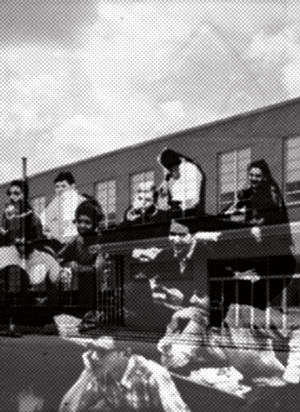Page 1 Page 2 Page 3 Page 4 Page 5 Page 6
“If the Nazis were still around, good point, fair deal. But here and now, in Philadelphia, so what if you’re Jewish? You’re white, you’re all right. And even if you run into the occasional yahoo who hates you guys, shit, what’s the stereotype on your people—that you know how to handle money, that you are all successful? What’s so bad about that—nothing like lazy, shiftless, welfare cheats, drug addicts, thugs, right? And even when we are recognized, say, for sports, for singing, what’s the take on that? Natural talent, nothing we get credit for working on, like we’re a bunch of baboons.”
“Yup.”
“Any crackers left, Stuart?”
I wound up at Germantown because I never fit in with the status-conscious kids at Leeds Junior High School who were selected, by dint of grades and aptitude tests, to attend Philadelphia’s all-academic, all-male, Central High School after 8th grade. I didn’t want to spend another three years wondering why my shoes, my clothes, my me didn’t quite cut it.
My parents had assumed that after failing to make the cut in 8th grade before nailing it in 9th (kind of a late-acceptance Mulligan), gladly join the crowd. And, not-coincidentally, avoid Germantown, with its trolley tracks, cobblestoned streets and, it was whispered (not always softly), gangs, crime, and black people.
Bear in mind that in ‘65, the sight of a black motorist halting momentarily at the stop sign at the top of my West Oak Lane rowhouse street sent those who could afford it off to Northeast Philadelphia or Cherry Hill, New Jersey, as fast as their narrow little minds could carry them. Not so my folks, maybe driven by mom’s liberalism born of fighting the stereotypes her Southern accent attracted, or necessitated by dad’s realization that we couldn’t afford the move.
And while the parents of some of my buddies reminded me that I’d be in the minority at Germantown—maybe two-thirds of its students were black—I was already the minority at Leeds, uncool, unconcerned with trends, uninterested in forcing myself to change for the sake of the crowd. And while I took a lot of shit from my junior-high friends about my decision, I was psyched about the whole thing.
So I found myself ensconced at Germantown, where my freshman-year lunchroom cocoon seemed safely distant from the turbulent outside world. The Vietnam War wasn’t yet the looming disaster it would become for us as we neared graduation and feared being drafted unless enrolled in four-year colleges. And while we were aware of the era’s racial strife and the Civil Rights efforts of Dr. Martin Luther King Jr. as well as the more pointed approach of Stokely Carmichael and H. Rap Brown, none of that prowled close to us as we stumbled happily into our later teen years.
By 1967, Walter grew, along with a nascent moustache, mostly stubble, a political consciousness, an edge. Who had the right Civil Rights strategy, Dr. King or the Black Panthers?
I was in King’s corner, while Walter wasn’t ready to pitch his tent on the non-violent side of the fence.
Which he made clear one day after school as we walked, my Jeff to his Mutt, on one of the athletic fields where I stumbled through my early journalistic days.


